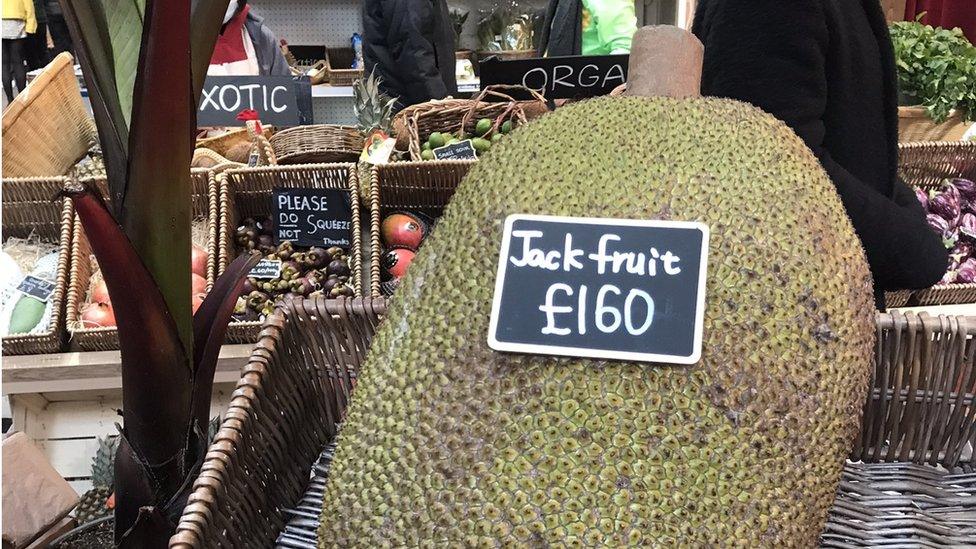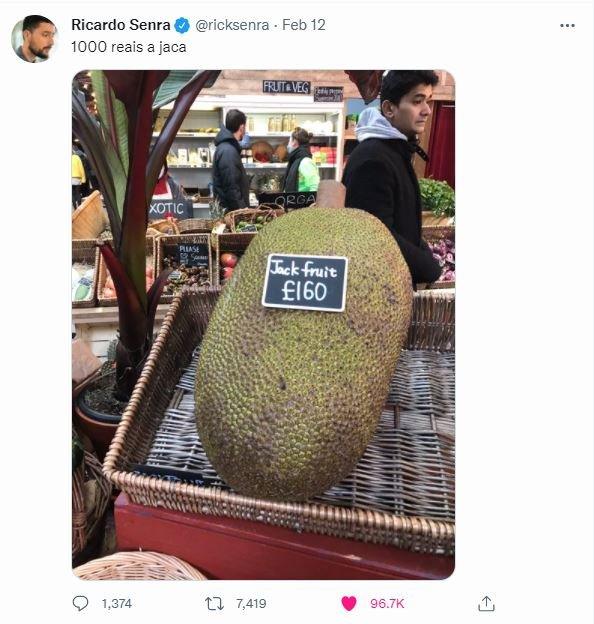Why a single fruit in a London market has a £160 price tag
- Published

The photo was taken by BBC reporter Ricardo Senra and went viral on Twitter in his home country, Brazil, with 100,000 shares: a jackfruit on sale for £160 ($218) in Borough Market, one of the largest and oldest food markets in London.
The over-the-top price tag has shocked Twitter users, with many joking they would fly to Britain to become "multimillionaires" by selling jackfruits.
After all, fresh jackfruits can be found in many parts of Brazil for the equivalent of $1.10 (81p)each, and are similarly affordable in many other tropical countries.
They can even be picked for free from the trees in many places, but the vast majority - at least in Brazil - are left to rot on the streets.
So what explains charging such a high price for a single fruit, considered "exotic" by some consumers? And why has the international demand for it grown recently?
Allow X content?
This article contains content provided by X. We ask for your permission before anything is loaded, as they may be using cookies and other technologies. You may want to read X’s cookie policy, external and privacy policy, external before accepting. To view this content choose ‘accept and continue’.
First of all, it is important to remember a basic rule: the point of sale impacts the price - and this applies to any product.
"Even in Brazil, the price of jackfruit varies. There are places where it is possible to pick it from the tree for free. In others, it is extremely expensive," Sabrina Sartori, CEO of Estancia das Frutas, an orchard that houses 3,000 fruit species in Sao Paulo state, has told the BBC.
Also, jackfruit is unable to be grown commercially in colder countries like the UK.
But there is more to it than that. The international trade of jackfruit, in particular, is quite complex and risky, experts say, for several reasons, including its perishable nature, its seasonality and its volume.
"The jackfruit is very heavy, turns ripe very fast and has a very peculiar aroma that is not pleasant to everyone," Sartori adds.
Weighing up to 40kg (88lb), the fruit, which originates from Asia, is extremely perishable and has a short shelf-life in the supermarket.
Jackfruit, often seen as unappetizing in the countries where it grows, has seen a soaring demand in developed nations driven by vegetarians and vegans, who consider it an alternative to meat. When cooked, its texture resembles beef or pork, making it a popular meat-free substitute like tofu, Quorn and seitan.
In the UK alone, the number of vegans is estimated at 3.5 million and counting.
However, when jackfruit becomes too ripe - and this process happens very fast - it acquires a sweeter flavour and can only be used for desserts.
A more affordable alternative for consumers, therefore, is to buy it canned.
Canned jackfruit can be found in British supermarkets for about $4 (£2.98) on average, but many say its taste is not the same.
Jackfruit is also very large, making it difficult to transport, and its harvest is seasonal. Packing is challenging due to the uneven shape, size and weight. It cannot be put in standard-sized boxes like other fruits. There is also no scientific way to tell if the fruit is in good condition just by looking at its exterior.
In addition to that, in the main countries that cultivate and export it, mostly in South and South-east Asia (the jackfruit is the national fruit of Bangladesh and Sri Lanka), there is lack of a marketing chain, and post harvesting practices don't exist. As a result, it is estimated that 70% of all production is lost.
In India, for example, jackfruit is seen as undesirable and stigmatised in rural areas as a poor man's fruit.
An additional element, experts say, is the lack of awareness - although jackfruit has become increasingly popular, many consumers have never tasted it and don't know any recipes they can make with it.
Fabrizio Torres, owner of Torres Tropical BV, an importer of exotic fruits based in the Netherlands, also adds that air freight has risen considerably with the Covid-19 pandemic.
"Many fruits from regions such as Asia and South America come to Europe on passenger planes. Airlines are looking now for higher value-added products for cargo space. Jackfruit is highly perishable and niche, so it is not worth importing it in large volumes. All this drives up the final price," he says.

Bright future
Despite all the obstacles, recent studies estimate an expansion of the international market for jackfruit.
According to estimates by consultancy IndustryARC, it is expected to reach $359.1 million (£52.75m) by 2026, growing at an annual rate of 3.3% during the period 2021-2026.
In 2020, the Asia-Pacific region accounted for the largest share of the jackfruit market (37%), followed by Europe (23%), North America (20%), rest of the world (12%) and South America (8%) - further evidence that South Americans, especially Brazilians, take their jackfruit for granted.